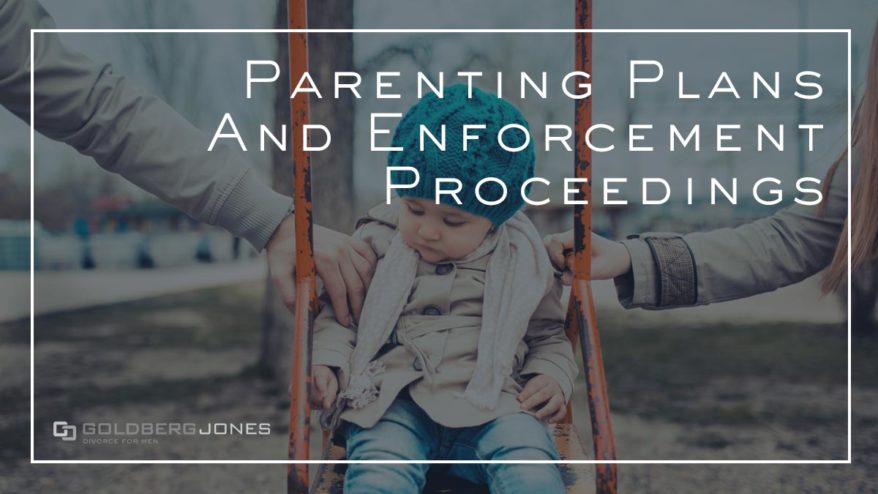It’s often difficult to remain part of your child’s life after a divorce or breakup. One thing that helps ensure you’re able to do this is the parenting plan.
This document outlines all the specifics of custody, visitation, holidays, and all the other schedule issues. But what if your ex won’t follow the rules? How can you enforce a parenting plan?
How Do You Enforce a Parenting Plan?
Parenting plans cover everything.
This includes where the child lives, which parent has decision-making power, how parents settle disputes, and more. They even address things like transportation and exchanges of the child.
Once in place, both parents are legally obligated to honor a parenting plan.
Problems arise when this cooperative arrangement falls apart. Circumstances change, details get missed in communication, and disagreements happen.
There are many ways parents often flaunt the established rules. This can be blatant, like your ex denying visitation, or it can be more subtle.
Perhaps it starts small, like your ex shows up late to drop off your kids or changes a vacation at the last minute. However it plays out, it’s often a slippery slope you should be aware of and watch.
Related Reading: What is a Parenting Evaluation?
Custody Agreement Violations
There are times when you must turn to legal means to get the other parent to adhere to the custody agreement.
Contempt of court as a concept is relatively simple: it’s the willful and intentional disobedience of a court order. When it comes to child custody agreement violations and family law issues, contempt manifests in a variety of ways:
- Denying your visitation as laid out in a parenting plan.
- Your ex won’t return your child at the end of a visit.
- Your ex doesn’t make reasonable attempts to require the child to make scheduled visits.
- Failure to make court-ordered support payments.
Related Reading: Criminal Charges and Custody
Motion For Contempt And Enforcement Proceedings
A motion for contempt is essentially an official means of requesting the court to compel the violator to abide by the court order.
The goal of a motion for contempt is to get the other party to follow the schedule in the future. In a custody agreement violation, enforcing a parenting plan most commonly takes the form of suing to enforce visitation, child support payments, and other specific terms.
What to do if a parent violates the parenting plan
The first step in enforcing your parenting plan is to file a motion seeking enforcement with the court.
Once you file this motion, the court will conduct a hearing no more than 45 days after the filing. Unless both parties agree to other terms. The court then reviews the motion to determine if a violation has occurred.
To be clear, enforcement proceedings can be long, expensive, and time-consuming. They’re most often used in flagrant cases or cases where a person is habitually in contempt of the parenting plan or custody arrangement. Sometimes, however, the threat of legal action may be enough to get your ex to play ball.
Related Reading: What Is The UCCJA? A Look At How It Protects Children
Common Enforcement Proceeding Outcomes
There are three typical outcomes to this type of enforcement proceeding. They are:
- A judge finds there was no violation, and no further action is taken.
- The parenting plan was violated, but with good reason, and no remedy is required.
- The parenting plan was violated, and a remedy was ordered.
Consequences of violating a parenting plan vary depending on the severity of the infraction. In relatively minor cases, the court may do something like allot one parent additional visitation to make up for lost time with the child.
On the more severe side, the court may order a hearing to modify the entire custody arrangement.
A judge can also:
- Add new terms to the parenting plan.
- Order counseling or parenting classes.
- Suspend child support.
- Enforce civil penalties.
- Order the offending parent to pay the other’s court and attorney fees.
- Hand down jail time if the case warrants such an action.
Related Reading: Parenting Evaluations in Oregon
Benefits Of Enforcement Proceedings
A successful outcome of enforcement proceedings is readily apparent: moving forward, your custody situation should be more straightforward and follow the previously established path. But there’s more.
If your ex is found in contempt for violating the parenting plan—meaning that a judge formally reprimands them—you may wind up with benefits beyond simple assurances they’ll follow the plan.
You may get additional time with your children to make up for missed visitations, holidays, or vacations. In some cases, since you almost certainly had to hire an attorney to represent you in enforcement proceedings, your ex may have to cover all or part of your legal fees if the violations are deemed willful and intentional.
It may only take one sound legal thrashing to set your ex straight. In some cases, even the threat of legal action may get things back on track. While no one wants to resort to enforcement proceedings, they can be valuable tools in the right situations.
Related Reading: What is a Status Quo Order?
